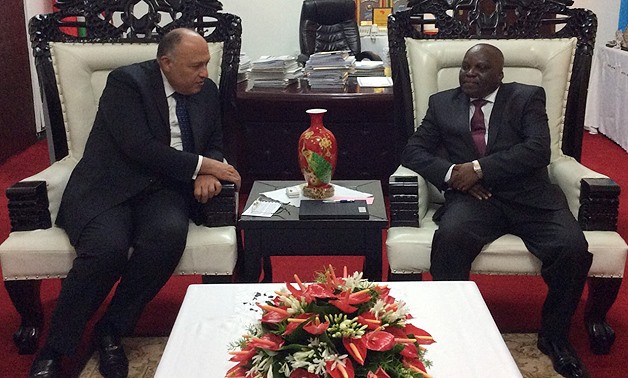
Foreign Minister Sameh Shoukry meeting with Burundi's President of National Assembly Pascal Nyabenda – Press photo
CAIRO – 17 April 2018: Burundi's President of National Assembly Pascal Nyabenda stressed his country’s full understanding of Egypt’s water needs and the extent to which the country depends on Nile water, Foreign Ministry spokesman Ahmed Abu Zeid said in an official Tuesday statement.
During a Tuesday meeting between Foreign Minister Sameh Shoukry and Nyabenda in Bujumbura, Burundi’s capital, Nyabenda said his country will always stand by Egypt in its efforts to preserve its water security.
On Apr. 15, Egypt has invited ministers of foreign affairs and irrigation, as well as heads of the intelligence agencies of Ethiopia and Sudan for another round of talks about the Grand Ethiopian Renaissance Dam (GERD), Shoukry told daily Al-Ahram.
Shoukry added that talks will be held in Cairo starting April 20. The minister is currently in Riyadh to attend preparatory meetings for the 29th Arab Summit.
Moreover, Shoukry said invitation for another round demonstrates just how keen Egypt is to reach a common understanding between the three parties.
The meeting included discussions regarding latest developments in GERD, parliamentary cooperation between the two countries, and efforts to accomplish domestic peace in Burundi.
Shoukry also stressed Egypt’s keenness to boost relations with Nile Basin countries, especially Burundi, which Egypt is committed to provide political and economic support to.
The Egyptian Foreign Minister also met with the Burundian President Alain Aimé Nyamitwe, where they discussed GERD negotiations and developments.
The minister demonstrated to Nyamitwe how serious and flexible Egypt has proved during talks and negotiations with Sudan and Ethiopia.
In the past seven years, Egypt, Ethiopia and Sudan have held several rounds of talks on the dam’s anticipated impact on Nile water resources.
Last Thursday, Egypt denied media reports claiming that Egypt “hindered” an agreement on the dam from being concluded during the last round of negotiations held in Khartoum.
This was in response to the media outlets that mentioned that Ethiopian Foreign Ministry spokesman Meles Alem had said that Egypt “lacks goodwill” to move forth with the consultations, and that the water ministries of Egypt, Ethiopia and Sudan have not planned to meet soon.
Foreign Ministry spokesperson Ahmed Abu Zeid remarked that Egypt has been willing during the meeting to reach an agreement in line with the directives of the three countries to reach a solution to break the current stalemate in the technical negotiations.
A round of discussions over the controversial dam between Egypt, Ethiopia, and Sudan in Khartoum were announced as failure. The Egyptian Foreign Minister said no agreement was reached after 18 hours of talks; he added that officials touched on all the outstanding issues that led to such controversy.
The meetings were resumed after a four-month hiatus due to a disagreement over technical issues related to the dam’s impact on the downstream countries of Egypt and Sudan.
Construction of the $4 billion dam started in April 2011, triggering tension with Egypt, which has voiced concerns over the dam negatively affecting its water share of the Nile river, a sacred symbol of the Egyptian civilization.
It was expected to be inaugurated in 2017, however, only 60 percent of the dam has been built so far according to Ethiopian press reports.
The dam is believed to affect Egypt’s agriculture, and will contradict its 87 percent of the Nile’s flow, according to treaties that date back to 1929.
Comments
Leave a Comment